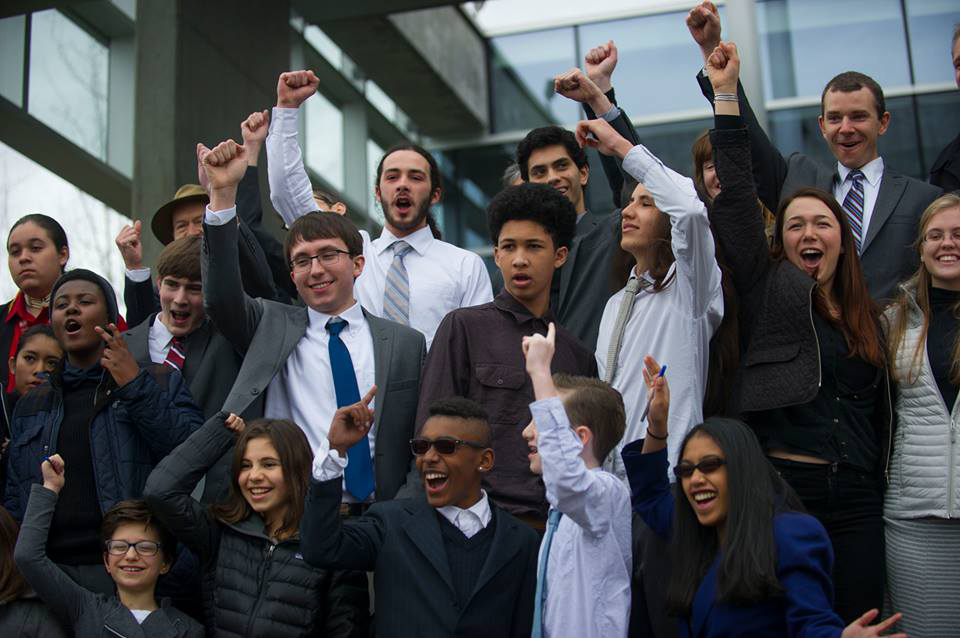God’s Abiding Presence in the Prophetic Action of 21 Young People
As a Mother of One of the Plaintiffs, a UCC Minister Reflects
“This is the best time to be born,” began 15-year-old Xiuhtezcatl Martinez he spoke to hundreds of youth and adults on the steps of the Federal Courthouse in Eugene, Oregon, “because we have the opportunity to change the course of history.” Here’s one way to live that opportunity: my 19 year old son Kiran, Xihutezcatl, and 19 other young people from all over the U.S. are suing the U.S. government and the entire fossil fuel industry. With the support of Our Children’s Trust, a nonprofit in Eugene, Oregon, they argue that the U.S. government’s persistence in proactively supporting the extraction, production, consumption, transportation, and exportation of fossil fuels is a violation of constitutional rights to life, liberty, and property as well as a violation of the Public Trust Doctrine which holds that it is the obligation of the U.S. government to protect natural resources for the use of present and future generations.
 |
| Photo: Our Children’s Trust/Robin Loznak |
This case and dozens of others like it throughout the U.S. and around the world, harken to the critical role of the courts in the civil rights movement. It also affirms the conviction that we are still a democracy with a court system that checks the power and responsibility of the legislative and executive branches of government. One argument of the defendants is that it is a legislative responsibility to mitigate climate change and laws currently in place are sufficient. Since the first international agreement to reduce CO2 in 1991, emissions have increased by 61%. It seems that leaving the remedy to elected officials has only made the problem worse. Julia Olson, OCT executive director, argues with passion and skill that not only is our planet imperiled, but so is our constitutional democracy. This case is bold, groundbreaking, and Bill McKibben of 350.org said, “This is as important a court case as the planet has yet seen.” I hope he is right.
What does it look like to live hope when the very fate of our planet is at stake? How do we enflesh the Easter Christ who triumphed over death itself in such a time as this? On March 9th, Judge Cotton heard arguments as to whether or not this case should be tried in court. We leaned in, hundreds of us inside and out that courtroom, tuning our ears to the ring of justice and the trumpet of truth. Judge Thomas Cotton asked difficult questions of each attorney, let no one off the hook, and looked long and wisely into the faces of each young plaintiff. In the courage and imagination and skill of the community that filled every available courtroom and flowed over the courthouse steps outside, our God abides. In the enduring hope of those young plaintiffs, our God abides. In the crafting of arguments and strategies grounded in imaginative love and enduring hope, in the strengthening of communities of joy and solidarity, our God abides.
On April 8 the news came: Judge Cotton decided that the case deserves to be heard. Sixteen-year-old plaintiff Victoria Barrett said, “People label our generation as dreamers, but hope is not the only tool we have. If anything, I’m going to use my positive energy to show my government that I won’t let my world stop for them. WE won’t let our world stop for them. Our generation will continue to be a force for the world.” Our God is faithful. Learn more about this case and others and about Our Children’s Trust at ourchildrenstrust.org.
 The Rev. Melanie Oommen is the Associate Minister at First Congregational United Church of Christ, Eugene, OR.
The Rev. Melanie Oommen is the Associate Minister at First Congregational United Church of Christ, Eugene, OR.
Related News
Walking the Talk: Environmental Practices and a Commitment to Justice
St. James United Church of Christ in Hamburg, New York (a suburb of Buffalo) has been...
Read MoreThe Antidote to Power from Above
With its themes of moral reckoning and repentance, this Lenten season brings into stark relief...
Read MoreDon’t Incinerate – Innovate!
Thirty-eight years ago, the United Church of Christ's Commission for Racial Justice released a...
Read More


